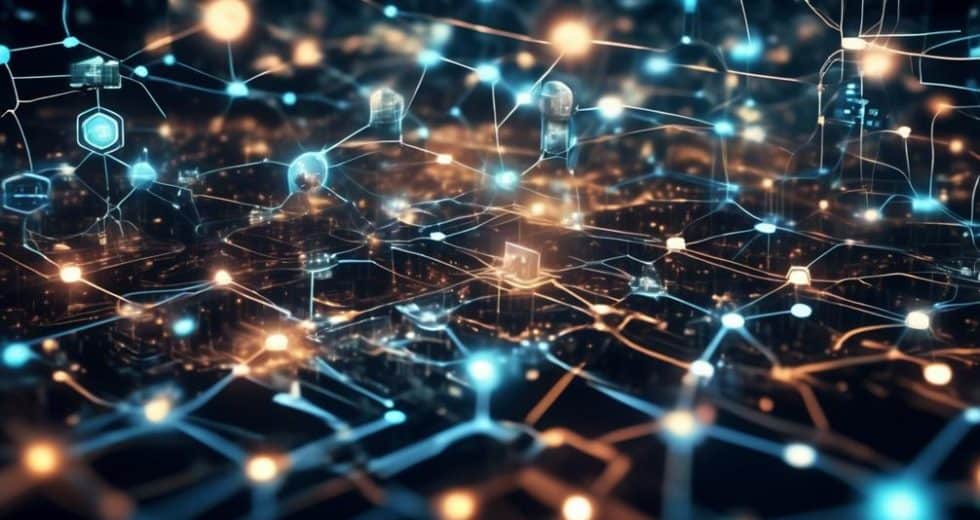In an era where the internet has become an integral part of our lives, it is natural to question what lies ahead for this ever-evolving phenomenon. As we bid farewell to the age of Web 2.0 and its interactive platforms, a new vision known as Web 3.0 emerges on the horizon.
With promises of a more intelligent and personalized online experience, Web 3.0 envisions a decentralized future where power and control are distributed among users. At the heart of this paradigm shift is the concept of a Decentralized Web, supported by blockchain technology.
However, the journey towards this decentralized internet is not without its obstacles, including technological challenges and ethical considerations. Join us as we explore the potential of Web 3.0 and the implications it holds for the future of the internet.
Key Takeaways
- Web 3.0, also known as the Semantic Web, promises smarter search engines, advanced AI, and virtual assistants that better understand and satisfy user needs.
- The Decentralized Web, or Web3, envisions a future internet where power and control are distributed, addressing concerns about centralization by tech giants. Users own their data, and blockchain technology plays a key role in enhancing privacy and fostering innovation.
- Decentralization aims to distribute power and control more evenly, offering an alternative to centralized platforms. Users have control over who accesses their data, and blockchain technology creates secure and verifiable records without the need for a central authority.
- Implementing Web 3.0 and the Decentralized Web presents technological challenges, such as developing new protocols and improving blockchain scalability, as well as ethical and legal considerations related to cybercrime, accountability, surveillance, and manipulation. Balancing the benefits and challenges of these advancements is crucial.
Advancements in Web 2.0
With the rapid advancements in Web 2.0, the internet has transformed from static pages to dynamic applications, ushering in a new era of interactivity, social media platforms, and user-generated content. This shift has brought both benefits and drawbacks to the online world.
On the positive side, Web 2.0 allows for greater user engagement and collaboration. It enables individuals to express themselves creatively, share information, and connect with others globally. Moreover, businesses can leverage social media platforms to reach a wider audience and build brand loyalty.
However, there are concerns regarding privacy violations, data monopolies, and the spread of fake news. As we move towards Web 3.0, it is crucial to address these challenges and develop technologies that prioritize user empowerment and data privacy.
Features of Web 3.0
The advancements in Web 2.0 have paved the way for the emergence of Web 3.0, a paradigm that promises a futuristic, analytical, and insightful internet experience.
One of the key features of Web 3.0 is the integration of AI advancements, which revolutionize the way businesses operate. With the ability to process and analyze vast amounts of data, AI-powered algorithms can provide valuable insights and predictions, enabling businesses to make more informed decisions and optimize their operations.
Additionally, Web 3.0 allows for personalized and tailored user experiences, as AI algorithms can understand user preferences and provide relevant content and recommendations. This level of customization enhances user satisfaction and drives engagement.
Vision of the Decentralized Web
In envisioning the future of the internet, the Decentralized Web emerges as a powerful paradigm, revolutionizing the current centralized landscape and fostering a truly democratic and innovative digital ecosystem.
The benefits of decentralization are evident, as it allows users to have greater control over their data and eliminates the need for a central authority. Blockchain technology plays a pivotal role in building the Decentralized Web, offering enhanced privacy and fostering innovation. Its impact is far-reaching, as it creates secure and verifiable records, ensuring transparency and trust.
The Decentralized Web not only addresses concerns about centralization by tech giants but also paves the way for a more inclusive and equitable online experience. By distributing power and control more evenly, the Decentralized Web empowers users and enables a more open and collaborative digital environment.
Concept of Decentralization
Decentralization emerges as a transformative concept in the future of the internet, revolutionizing the current centralized landscape and empowering users with greater control and ownership over their data. This concept holds immense importance for user control and has a significant impact on data privacy.
Here are four key points to consider:
- User Control: Decentralization enables users to have greater control over their data. They can decide who accesses their information and have the power to revoke access if needed.
- Enhanced Privacy: Decentralization reduces the risk of data breaches and privacy violations. By distributing data across multiple nodes, it becomes harder for malicious actors to gain unauthorized access.
- Data Ownership: With decentralization, users have ownership of their data. They are not dependent on centralized platforms to store and control their information.
- Transparency: Blockchain technology, a crucial component of decentralization, provides secure and verifiable records. This transparency fosters trust and accountability in the digital realm.
Challenges in Implementing Web 3.0
Implementing Web 3.0 presents a myriad of challenges that must be overcome to realize its transformative potential in the future of the internet.
Technological hurdles are one of the primary challenges in achieving the vision of Web 3.0. The development of new protocols and improved blockchain scalability are crucial to ensure the seamless integration of decentralized technologies.
Additionally, adoption barriers pose significant challenges. Convincing users to embrace the decentralized web and understand the benefits of owning and controlling their data requires education and awareness campaigns. Overcoming the inertia of centralized platforms and their convenience is another adoption barrier that must be addressed.
Furthermore, ethical and legal considerations, such as cybercrime and accountability, need to be addressed to ensure the security and trustworthiness of Web 3.0.
Ethical and Legal Considerations
As the future of the internet unfolds, the realization of Web 3.0 and the decentralized web brings forth a crucial consideration: the ethical and legal implications that accompany this transformative paradigm shift.
The following are the key considerations in this regard:
- Cybersecurity implications: With the increased connectivity and openness of Web 3.0, ensuring robust cybersecurity measures becomes paramount. The decentralized nature of the web brings new challenges in protecting user data and preventing cybercrime.
- Data ownership: In the decentralized web, users have greater control over their data. However, this raises questions about who owns the data and how it can be used. Clear regulations and frameworks are needed to address issues of privacy, consent, and data monetization.
- Accountability: With the absence of centralized authorities, holding individuals and organizations accountable for their actions becomes more complex. Legal frameworks need to adapt to ensure that individuals and entities are held responsible for any harm caused in the decentralized web ecosystem.
- Ethical decision-making: As Web 3.0 enables advanced AI and machine learning algorithms, ethical considerations become crucial. The development and deployment of these technologies must be guided by ethical principles to prevent bias, discrimination, and other harmful consequences.
Navigating the ethical and legal landscape of Web 3.0 requires careful thought and proactive measures to address cybersecurity implications, ensure data ownership, establish accountability, and promote ethical decision-making.
Balancing Benefits and Challenges
Finding the equilibrium between the advantages and obstacles presented by Web 3.0 and the Decentralized Web requires careful consideration and strategic decision-making. On one hand, Web 3.0 offers exciting possibilities such as smarter search engines, advanced AI, and virtual assistants that better understand and satisfy user needs. It also promises enhanced privacy and fosters innovation through the use of blockchain technology. However, there are ethical implications to consider, such as the potential for increased surveillance and manipulation. Additionally, the implementation of Web 3.0 and the Decentralized Web presents technological challenges that need to be overcome, including the development of new protocols, improved blockchain scalability, and broad adoption. Balancing these benefits and challenges is crucial to ensure user empowerment while safeguarding privacy and accountability.
| Benefits | Challenges |
|---|---|
| Smarter search engines and advanced AI | Ethical implications of increased surveillance |
| Enhanced privacy and user ownership of data | Technological challenges in implementing Web 3.0 |
| Fosters innovation through blockchain technology | Legal considerations such as cybercrime and accountability |
| Better understanding and satisfaction of user needs | Potential for manipulation and misinformation |
| Distributed power and control, not concentrated in few platforms | Broad adoption and scalability of new protocols |
Frequently Asked Questions
How Does Web 3.0 Aim to Address Concerns About Privacy Violations and Data Monopolies?
Web 3.0 aims to address concerns about privacy violations and data monopolies by implementing privacy regulations and promoting data ownership. Through decentralized structures and blockchain technology, users have more control over their data, reducing the power of centralized platforms.
What Role Does Blockchain Technology Play in Building the Decentralized Web?
Blockchain technology plays a crucial role in building the decentralized web by providing secure and verifiable records, eliminating the need for a central authority. It offers enhanced privacy, fosters innovation, and has various applications in finance and supply chain management.
How Does the Concept of Decentralization Offer an Alternative to Centralized Platforms?
Decentralization offers an alternative to centralized platforms by redistributing power and control, empowering users to have ownership and control over their data. It promotes a vision of decentralized governance, fostering transparency and innovation in a more user-centric internet.
What Are the Technological Challenges in Implementing Web 3.0 and the Decentralized Web?
The implementation of Web 3.0 and the Decentralized Web faces technological challenges and implementation barriers. These include the need for new protocols, improved blockchain scalability, and widespread adoption. Addressing these challenges is crucial for realizing the vision of a decentralized internet.
What Potential Ethical and Legal Considerations Arise With the Advent of Web 3.0 and the Decentralized Web?
Ethical and legal implications arise with the advent of Web 3.0 and the Decentralized Web. These include concerns about cybercrime, accountability, increased surveillance, and manipulation. Balancing the benefits and challenges is crucial for the future of the internet.
Conclusion
In conclusion, the future of the internet lies in the decentralization and implementation of Web 3.0. This paradigm shift towards a more intelligent and personalized online experience holds immense potential for enhancing privacy, fostering innovation, and distributing power among users.
However, the realization of this vision comes with its own set of challenges, including technological hurdles and ethical considerations. The development of Web 3.0 requires advancements in areas such as artificial intelligence, machine learning, and data management. Additionally, concerns about data privacy and security need to be addressed to ensure that users have control over their personal information.
Nonetheless, with the increasing adoption of blockchain technology and the ongoing efforts towards a decentralized web, the future of the internet looks promising and transformative. The use of blockchain can provide a secure and transparent framework for data storage and transactions, while also enabling users to have greater control over their digital identities. Moreover, the decentralization of the internet can empower individuals and communities, giving them more autonomy and reducing the influence of centralized entities.
Overall, the future of the internet lies in the hands of those who are working towards the development and implementation of Web 3.0. By addressing the challenges and harnessing the potential of decentralized technologies, we can create a more inclusive, secure, and innovative online ecosystem.






